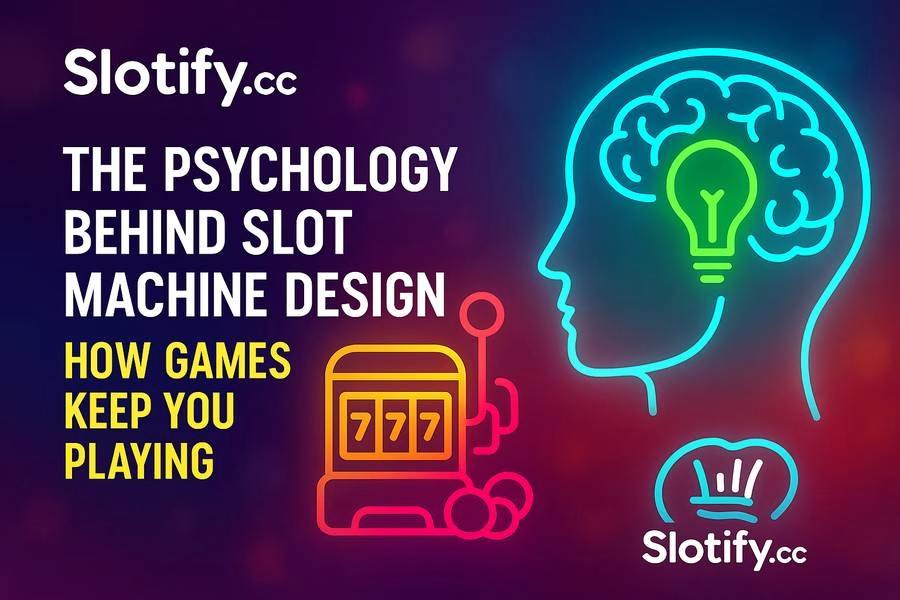Slot machines are more than just games of chance. They’re carefully crafted experiences designed to keep you engaged, entertained, and coming back for more. But how exactly do they do that? The answer lies in slot machine psychology. Game developers use behavioral science to shape how slots look, sound, and play. In this article, we explore the psychological tricks and design choices that influence your behavior — often without you even noticing.
Understanding slot machine psychology is crucial for players who want to maximize their enjoyment and success.
This phenomenon is a key aspect of slot machine psychology, influencing the way players interact with these games.
In recent years, the popularity of slot machines has skyrocketed, with players flocking to both physical casinos and online platforms. This surge in interest has prompted game developers to continually innovate, introducing fresh themes and features to maintain player engagement. From the classic fruit machines to modern video slots with intricate storylines, the evolution of slot machines reflects changing player preferences and technological advancements.

The Role of Themes in Player Attraction
This engagement is a direct result of slot machine psychology, which helps to create more immersive experiences.
Each theme draws on elements of slot machine psychology, enhancing the allure and appeal.
Visuals That Hook You Instantly
By applying the principles of slot machine psychology, developers create games that resonate deeply with players.
This tactile engagement is part of the broader framework of slot machine psychology, fostering a deeper connection to the game.
Moreover, special features like free spins, bonus rounds, and progressive jackpots are often tied to these themes, offering players the chance to experience their favorite stories in a new and interactive way. This not only enhances gameplay but also keeps players returning to see what new adventures await them.
This knowledge is essential for understanding the principles of slot machine psychology and how they affect player behavior.
Themes play a crucial role in attracting players to specific slot games. Whether it’s a beloved movie franchise, an adventurous treasure hunt, or mythical creatures, themes resonate with players on a personal level. Developers often collaborate with popular media to create themed slots that tap into existing fan bases, enhancing player interest and engagement. For instance, a slot game based on a hit TV series may feature characters, soundtracks, and visuals that fans recognize, creating a deeper emotional connection and increasing the likelihood of play.
Familiar symbols are strategically chosen based on slot machine psychology to create positive associations.
The Impact of Touch and Interaction
The interplay of sound and visuals is a key component of slot machine psychology, enhancing emotional responses.
These cues are vital in slot machine psychology, reinforcing the connection between sound and winning.
Resources that educate players on slot machine psychology can lead to more responsible gaming habits.
The complex design elements are rooted in an understanding of slot machine psychology, creating compelling gameplay.
Understanding slot machine psychology can help players make more informed choices and enjoy a healthier gambling experience.
By grasping these psychological concepts, players can engage more thoughtfully with slot machines.
Modern slot machines often feature touch screens that allow for more interactive gameplay. Players can swipe, tap, and engage with the game in a way that feels more personal and immersive. This tactile interaction not only enhances the gaming experience but also gives players a greater sense of involvement. The act of pulling a lever or pressing a button can evoke nostalgia, reminding players of traditional mechanical slots while still enjoying the benefits of modern technology.
The Social Aspect of Slot Gaming
Recognizing the near-miss effect is a crucial insight into slot machine psychology and its impact on player behavior.
This illusion of control exemplifies the nuances of slot machine psychology, often leading players to engage more deeply.
Slot games are a feast for the eyes. Bright colors, themed artwork, and animated effects are all designed to capture attention. Studies show that color and motion trigger dopamine responses, the brain’s reward chemical. Developers use this knowledge to create interfaces that feel instantly exciting.
The unpredictability of wins is a fundamental aspect of slot machine psychology that keeps players coming back.
This mechanism plays into the core of slot machine psychology, creating a cycle of anticipation and excitement.
In addition to visuals and sounds, social interaction has become a significant component of slot gaming. Many online platforms now incorporate features that allow players to connect with friends, share wins, and even compete against each other. This social aspect can lead to a more enjoyable experience as players feel a sense of community while engaging with the games. Live streaming of slot gameplay has also gained popularity, allowing players to watch others spin the reels in real time, further enhancing the social nature of the games.
By being aware of slot machine psychology, players can better navigate their gaming experiences and make informed choices.
Symbols often resemble familiar and comforting items like fruit, gold coins, or lucky charms. These visuals aren’t just for fun — they activate positive associations and memories, making you feel good while you play. Reels that flash, pulse, or shimmer subtly keep your eyes on the screen, increasing time spent in the game.
Sounds That Reinforce Rewards
The audio design in slot machines is just as strategic as the visuals. From upbeat jingles to celebratory sound effects, every audio cue is engineered to reinforce the idea of winning. Even a small payout is often accompanied by a fanfare of sounds, making the win feel more significant than it really is.
These sound cues tap into our brain’s reward systems. Over time, players begin to associate these cues with the pleasure of winning, creating a cycle of reinforcement that encourages continued play. It’s a psychological loop similar to what drives habits in apps and social media.
Many casinos and online platforms offer resources for players to learn more about responsible gambling practices. These resources can include self-assessment tools, information on how to recognize problem gambling behaviors, and tips for setting personal limits. By utilizing these tools, players can enjoy slot machines in a way that prioritizes their well-being while still experiencing the excitement these games have to offer.
The combination of visual appeal, engaging sounds, interactive elements, and social interactions form a complex web designed to keep players coming back for more. As we explore the world of slot machines, it’s clear that the fusion of design and psychology creates an experience that is both captivating and, at times, challenging to navigate. By understanding these elements and being mindful of our play, we can strike a balance between enjoyment and responsibility.
Conclusion: The Dance of Design and Psychology
As the allure of slot machines continues to grow, so does the importance of responsible gambling. Understanding the psychological principles at play can empower players to make informed decisions while enjoying these games. Setting limits on time and money spent is essential in ensuring that gaming remains a fun and entertaining activity rather than a source of stress or financial strain.
Near Misses and Illusions of Control
Responsible Gambling and Mindful Play
Ever noticed how close you were to a big win? That’s no accident. Slot games are designed to show near missesfrequently. These moments create a sense of “almost winning” that can be even more motivating than an actual win.
This phenomenon, called the “near-miss effect,” taps into our competitive instincts and keeps us trying. Some games even allow you to choose symbols or bonuses, giving the illusion that your decisions affect the outcome. This illusion of control increases engagement, even though outcomes remain random.
Random Rewards and Variable Payouts
Slot machines use a psychological principle known as variable-ratio reinforcement. This means you never know when the next win will come — and that uncertainty is exactly what keeps players hooked.
Unlike games where rewards come at predictable intervals, variable rewards are more addictive because they generate anticipation. It’s the same psychological mechanism behind checking social media or playing mobile games. The next win could always be just one spin away.
Final Thoughts
Understanding how slots are designed can help you play more mindfully. These games are built to entertain, but they also use clever psychological techniques to keep you spinning. Knowing what drives your behavior can give you more control over your gameplay.
At Slotify.cc, we believe knowledge is power. Whether you’re playing for fun or chasing a big win, being aware of how games are designed can help you enjoy the experience responsibly.










[…] exploring slot machine psychology players can gain insights into their emotional patterns. The most successful gamblers treat gaming […]
[…] narrativas inmersivas que transforman el juego simple en una experiencia interactiva de narración. Aprende más sobre la psicología de las máquinas tragamonedas en nuestra guía en profundidad para entender los mecanismos más profundos que impulsan el compromiso del […]
[…] og fordybende fortællinger, der omdanner simpel gambling til en interaktiv fortælleoplevelse. Lær mere om spillemaskiners psykologi i vores dybdegående guide for at forstå de dybere mekanismer, der driver spillerens […]
[…] jotka muuttavat yksinkertaisen uhkapelin interaktiiviseksi tarinankerrontakokemukseksi. Tutustu lisää kolikkopelin psykologiaan kattavassa oppaassamme ymmärtääksesi syvemmät mekanismit, jotka ajavat pelaajan […]
[…] che trasformano il semplice gioco d’azzardo in un’esperienza interattiva di narrazione. Scopri di più sulla psicologia delle slot machine nella nostra guida approfondita per comprendere i meccanismi più profondi che guidano il coinvolgimento del […]
[…] og oppslukende fortellinger som forvandler enkel gambling til en interaktiv fortelleropplevelse. Lær mer om psykologien bak spilleautomater i vår inngående guide for å forstå de dypere mekanismene som driver […]